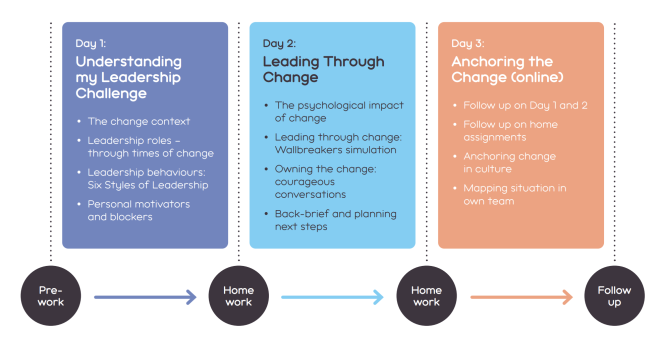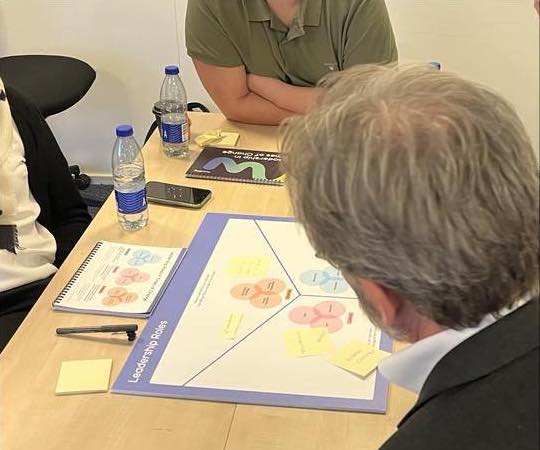In today’s fast-paced business world, global corporations face a common challenge: how to effectively guide diverse groups of leaders through times of change, each presenting unique challenges, while still adhering to overarching strategic objectives. How can leaders be empowered to navigate collectively while tailoring their decisions according to the distinct needs of their local situations?
This was the challenge for Nuuday, a Danish telecommunications and digital services company, when they embarked on an ambitious company-wide transformation aiming to become the leading digital service provider.
Nuuday reached out to Workz for help with designing and implementing a leadership programme that was tailored to their specific transformation and organisational journey. “It was crucial for us that this programme went beyond a mere change management course. Our objective was to equip our leaders with the skills to navigate through times of change, given the ongoing transformation within our organisation,” says Mattias Krogh-Møller, Head of Talent, Learning & Development, Nuuday.
The primary aim of the program was to support leaders in translating and aligning their individual goals and challenges with the strategic change objectives of each business unit, extending across the entirety of Nuuday. A key emphasis was put on effectively managing the people side of change, offering valuable guidance to leaders and employees alike.
Uniting Leaders with Diverse Backgrounds
To ensure company-wide alignment and the development of a shared language on leading in times of change, Nuuday decided to have all 350+ leaders participate in the same programme. This meant that the program had to be relevant for both high-level leaders with more than 20 years of experience and team leaders who might had been promoted to their first leadership position less than a month ago. To accommodate these target groups the programme had to be challenging, engaging and tangible.
This was done by creating training modules that cultivated a shared understanding of the challenges ahead, created a sense of unity through knowledge sharing and enabled effective navigation of the upcoming journey by translating the strategic objectives to the local context of the leaders. All tied together with a focus on the human side of change. In Mattias Krogh-Møller’s words: “The programme was hands-on and tailored to the local business context, offering the necessary flexibility to adjust agenda points and exercises based on the specific needs of each Business Unit or individual class.”
The Structure of the Programme
The programme unfolded over the course of three days with the following themes:

The programme consisted of two days of on-site training and a shorter online check-in. The modules were spaced about a month apart giving the participants time to apply the learning from one module before starting on the next and encouraging a culture of continued action and reflection.
Each module incorporated practical tools, models and engaging exercises that gave the participants an opportunity to reflect on how the different tools and models were reflected in their own context.
A visual workbook provided coherence throughout the programme and was used both during each module and for homework between the modules to support reflection and transfer. Furthermore, the workbook contained additional exercises and reading recommendations for the participants to use after the end of the programme.
Contextualising Leadership for Effective Change Management
Leading in times of changes requires a diverse skillset. Leaders need to consider the impact specific changes will have both on their individual team members and on the local processes. They also must be comfortable with – or at least proficient in – managing ambiguity as large-scale changes always involves an element of uncertainty and all answers might not be always available. Moreover, they need to frame organisation wide initiatives in a way that makes sense within the unique context of their own business unit.
To equip the participants with these skills set we heavily emphasised the importance of tailoring leadership approaches to the specific needs and challenges of each part of the organisation. There is no one size fits all when leading in times of change.
Translation of content into context thus became a central theme of both the content of the module and how we approached the task as facilitators. Our role was to help the participants translate their learnings to their own specific context to enable them to take local action that resonated both with the needs of their team members and with the requirements of the change in their business unit.
This translation also met the needs of the participant as their primary desire was for practical and applicable tools and insights, rather than theoretical concepts and models for their own sake. Their main focus was primarily , on obtaining actionable knowledge that can be directly implemented in their daily work.
By delivering on this desire the programme promoted local clarity, fostered buy-in from team members, and encouraged accountability within the organisation.

Running the Programme
Workz executed all the 78 sessions of the leadership programme. Through this we developed a close understanding of not just Nuuday in its entirety but also of the needs of the different areas and business units. Furthermore, running the workshops physically we were able to build trust and promote deep conversations amongst the participants, which can be hard to do in a virtual setting. Mattias Krogh-Møller sums it up: “One key aspect that contributed to the programme’s effectiveness was the presence of few, dedicated trainers who focused on building a comprehensive understanding of our business units”.
The End Result
We ended up delivering a programme that was both well-received by the participants and met the strategic needs of the client. Throughout the process we learned valuable lessons about both change in complex organisations and working with the highly diverse target group. Because of the number of workshops, we were able to apply these learnings to later modules. According to Mattias Krogh-Møller “We highly appreciate the flexibility demonstrated by Workz throughout the duration of our programme. This adaptive approach also helped make the programme more in line with the needs of the participants. A sentiment shared by Nuuday: “Their willingness to adapt and accommodate to our requirements ensured the programme’s success.”
We are grateful to have had the opportunity to be a part of this journey and proud of the positive outcomes of the programme. It has been great to contribute to the development of the participants and we sincerely appreciate their trust and active involvement throughout the process.

